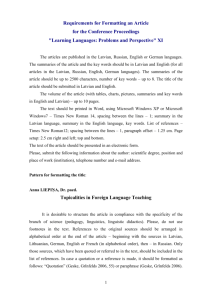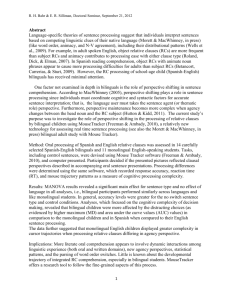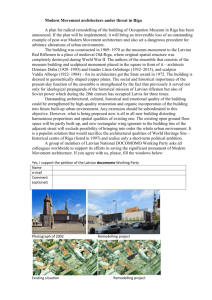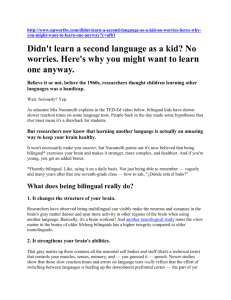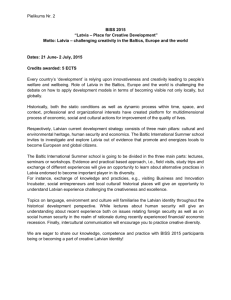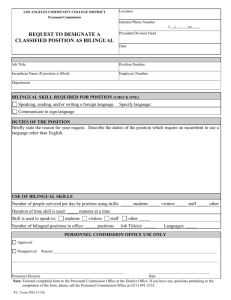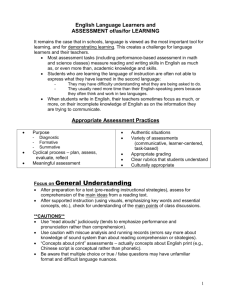Does bilingual education in Latvia has an impact to bilingual
advertisement
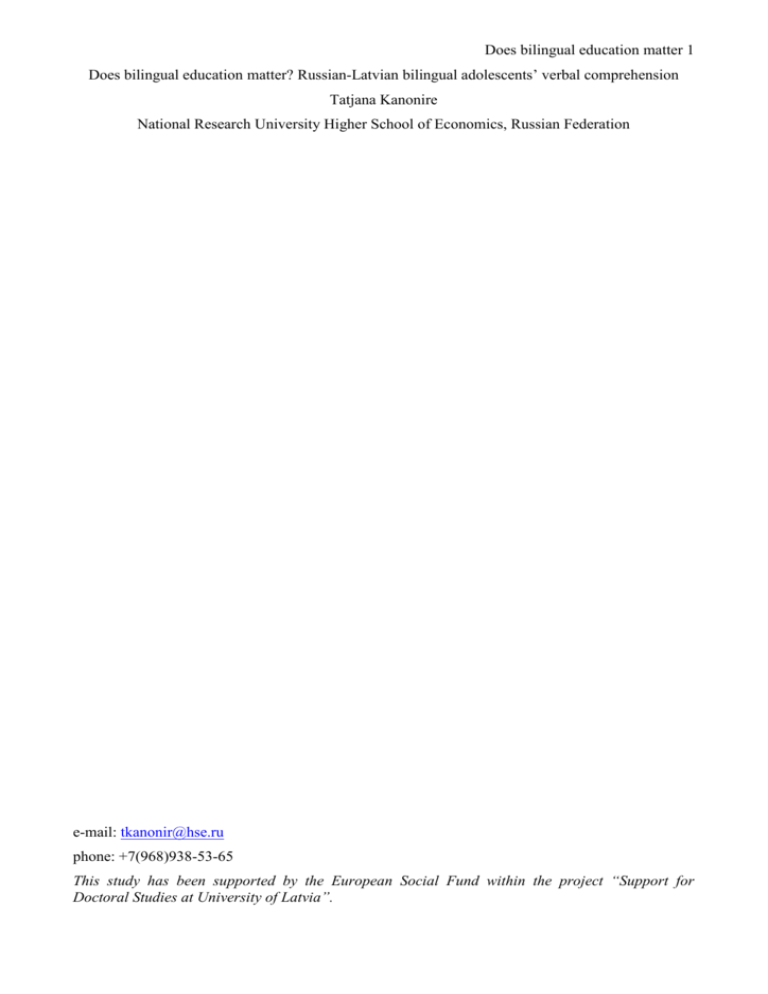
Does bilingual education matter 1 Does bilingual education matter? Russian-Latvian bilingual adolescents’ verbal comprehension Tatjana Kanonire National Research University Higher School of Economics, Russian Federation e-mail: tkanonir@hse.ru phone: +7(968)938-53-65 This study has been supported by the European Social Fund within the project “Support for Doctoral Studies at University of Latvia”. Does bilingual education matter 2 Abstract This study examined general and scientific concepts’comprehension in Russian-Latvian bilingual adolescents from minority schools. These adolescents acquire educational curriculum in both Latvian and Russian but in everyday communication they use mostly Russian. Russian-Latvian bilingual sample consisted of 72 participants and Latvian monolingual sample consisted of 89 participants. All participants aged between 14 and 16 and studied in the 9th grade. In bilingual sample general and scientific concepts’comprehension was measured in Russian and Latvian but in monolingual only in Latvian. Bilinguals keep their native Russian language on the same comprehension level as monolinguals but their comprehension level in second Latvian language is significantly lower than in Russian. Key words: general and scientific concepts, verbal comprehension, bilingualism. Does bilingual education matter 3 Introduction Bilingual education differs across the countries. It depends on attitude to bilingualism, traditions to use more than one language, country’s policy and other factors. Latvian bilingual education system is influenced by Canadian immersion system. But still it is different in terms of historical and cultural aspects, and the way of realisation. During the first years of independence of Latvia, the Soviet educational system was used. It is expressed as two educational streams with different curriculum divided by ethnic and language principle - Latvian stream and Russian stream. Russians are the greatest minority group in Latvia till today. In 2013 they formed 26% of total population (or 530 419 persons) (Statistical Yearbook of Latvia 2013, 2014). In 1998 a new Education law was passed in Latvia (from 06.10.1999). On the one hand, this educational reform introduced equal curriculum for all schools in Latvia, but, on the other hand, education for minorities (and for Russians as well) became bilingual. In minority schools pupils learn Latvian as a subject and at the same time Latvian becomes a language of learning instructions in many subjects (Izglītības likums, 1998). It has to be mentioned that the term “bilingual education” does not appear on Education law but is widely used among politicians, teachers and researchers. From September, 2004 all minority education at high school (from 10th to 12th grade) has to use the rule of 60/40, i.e. 60% of all subjects are thought in Latvian and 40% in native language (05.02.2004. likums "Grozījumi Izglītības likumā). Such education system assumes good Latvian knowledge at least at the 9th grade. But can we expect high Latvian language proficiency level at the 9th grade? This question has to be studied. Russian-Latvian adolescents in Latvia are mostly successive bilinguals. In their everyday communication with friends, family and even at school, they use native (Russian) language as a primary one and they use Latvian mostly during school studies. Another factor that we have to take into account is wide agreement that the bilingual reform on the primary level had several problems due to the lack of funding, guidance, support structures, motivation of educators and parents (Silova, 2002; Bilingvālās izglītības ieviešanas analīze, 2002; Latvijas izglītības reforma, 2003). Few studies show the increase of Latvian language proficiency across Russian minority adolescents (Cara, 2010; Valsts pārbaudes darbi, 2014). The data of centralized Latvian exams in Russian minority schools indicate medium Latvian proficiency for 62.79% of pupils in 2009/2010 and 65.96% in 2010/2011 (Ivlevs, & King, 2014). But these data should be treated with caution: proficiency level is computed on the concrete year population; these Latvian exams are adapted for minorities and can not be comparable with Latvian as native language exam in Latvian schools. The risk of native language proficiency decrease exists in bilingual education. We can predict that general concept comprehension will be high enough in case of Russian-Latvian adolescence Does bilingual education matter 4 because they use native language very often. But we do not have data about scientific concepts comprehension in Russian as almost 60% of the curriculum is studied in Latvian or bilingually. The effectiveness of bilingual education appears not only as pupils’ academic achievements, but also as high proficiency level in two languages. The basis of language proficiency is verbal comprehension – the ability to perceive and understand linguistic units (Sternberg, & Powell, 1983). It is possible to observe verbal comprehension on different levels but the basic level is concepts comprehension. The ability to understand concepts’ meaning develops the basis for complex idea comprehension which are expressed in written or spoken sentences (Swanson, Saez, Gerber, & Leafstedt, 2004; Berninger, Abbott, Swanson, et. al, 2010). Vocabulary is more common task for concept comprehension. Vocabulary deapth task has to be used because such task provides the information about how deeply the meaning of concept is understood by a student. In situation when pupils acquire curriculum in two languages (some subjects in native language, some – in second language or bilingually), the study of scientific concepts comprehension becomes important. Scientific concepts are mostly abstract and they are acquired in the context of education; therefore they are more complex comparing to the general concepts that are acquired mostly from the life experience. Therefore the following research question is raised: how does bilingual adolescents’ general and scientific concepts’ comprehension in native language differ from verbal comprehension in their second language? To be able to compare comprehension in Russian and Latvian, tests with parallel language versions were constructed. These tests’ versions are equal by content and difficulty level. As we do not know the level of bilinguals’ proficiency in Russian and Latvian, the “criteria” is needed. The monolingual adolescents with native Latvian from majority schools could provide such “criteria”. If bilinguals’ comprehension level in Russian (native language) will be the same as monolinguals’ comprehension in Latvian, we could conclude that bilinguals retain their comprehension in native language on native-like level. And if bilinguals’ comprehension level in Latvian will be the same as monolinguals’, we could conclude that bilinguals reached native-like level in second language comprehension. So the second research question is: how does general and scientific concepts’ comprehension differ between bilingual and monolingual adolescents in language common to both groups (native Latvian language for monolinguals and second Latvian language for bilinguals) and in their native language? Method Participants. The bilingual group consisted of 72 participants from various minority schools in Riga aged between 14 and 16 (M = 15.07, SD = .48), of whom 50% were boys and 50% - girls, their native language was Russian. All participants were studying in the 9th grade. Does bilingual education matter 5 The monolingual group consisted of 89 participants aged between 14 and 16 (M = 15.01, SD = .49), of whom 48% were boys and 52% were girls. All participants were studying in the 9th grade in a basic educational curriculum (i.e. in Latvian) and their native language was Latvian. Some of them were enrolled in Riga’s schools (67%), but some from schools in other cities. There are no statistically significant differencies in Vocabulary test in Latvian ((t (87) = 1.67, p > .05)) and in Scientific Concepts Test in Latvian ((t (87) = .85, p > .05)) between adolescents from Riga and other cities. Bilingual and monolingual groups do not differ by age ((t (159) = - .76, p > .05)) and gender ((χ2 (df = 1) = .07, p > .05)). Instruments. 1. Vocabulary test in Russian (VT-R) and Latvian (VT-L) (Turilova-Miščenko, Raščevska, 2011) for general concepts comprehension measurement. Each test consists of 15 items. The item pool of both VT-R and VT-L includes semantically similar and phonologically different items. All items are generally used concepts (e.g. “book”, “product”), the task is to define a word. The Spearman-Brown split-test reliability index of the VT-L is .73; the Spearman-Brown split-test reliability index of the VT-R is .68. Both test’ versions have similar difficulty: VT-R difficulty is 1.15 and VT-L difficulty is 1.13. 2. Scientific Concepts Test Russian version (SCT-R) and Latvian version (SCT-L) (TurilovaMiščenko, Raščevska, 2011) for scientific concepts comprehension measurement. Total item pool of each test is 26 items. There are two scales – the Natural Science Scale and the Humanities Concepts Scale. General comprehension of scientific concepts is reflected by the full score. The task is to define scientific concepts from history, literature/language, mathematics and biology. The test content is in accord with Latvian Primary Education Standard subject areas for the 9th grade (LR Izglītības Ministrija, 2008). The Spearman-Brown split-test reliability indices for both versions vary from .73 to .86. Both test’ versions have similar difficulty: SCT-R Full scale difficulty is .97 and SCT-L Full scale difficulty is .86. Procedure. State supported secondary schools participated in the study. Students in the 9th grade were randomly selected for the study with permission from the school administration and their parents,. All participants took part in the test voluntarily and were tested individually. The data were collected during academic year 2009/2010 and 2010/2011. Bilinguals were tested twice – in Russian and in Latvian. The first testing language was randomly selected taking into account the gender. Thus, bilinguals formed two subsamples – one of them had the first testing in Russian and second testing in Latvian (49% of the sample) but second subsample – vice versa. The sequence of the testing language did not affect tests results. Does bilingual education matter 6 Results To answer the research question how bilingual adolescents’ verbal comprehension and working memory differ when they are measured in Russian and in Latvian, the t-test for paired samples was used. Bilinguals have higher level of general and scientific concepts comprehension in native Russian language than in second Latvian language (Table 1). Table 1. Descriptive statistics and paired samples t-test for verbal comprehension tests in Russian and Latvian for bilinguals Tests Scientific Concepts Test Humanities concepts scale Natural science scale Full scale Vocabulary Test **p = .00 Russian version M SD Latvian version M SD 10.88 12.38 23.25 17.35 5.49 6.50 11.99 11.07 3.84 5.13 8.32 4.23 t (df = 71) 3.88 5.25 8.62 5.63 12.17** 10.75** 12.33** 10.82** To determine the existence of differences in verbal comprehension between bilingual and monolingual adolescents, the t-test for independent samples was used. There are statistically significant differences between monolinguals and bilinguals in verbal comprehension when bilinguals take tests in Latvian. Bilinguals have lower results in all tests comparing to monolinguals. However, if bilinguals and monolinguals take tests in their native language (bilinguals in Russian and monolinguals in Latvian), there are no statistically significant differences in comprehension (Table 2). Table 2. Monolingual and bilingual adolescents’ descriptive statistics and independent samples ttest for verbal comprehension tests in Latvian and Russian Monolingual group¹ (n = 89) Bilingual group² (n = 72) t (df = 159)3 bilingual group¹ (n = 72) t (df = 159)4 Tests M SD M SD M SD Scientific Concepts Test Humanities concepts scale 10.18 3.82 10.88 3.84 5.49 3.88 -1.15 7.70** Natural science scale 13.08 5.16 12.38 5.13 6.50 5.25 .89 7.98** Full scale 23.26 8.50 23.25 8.32 11.99 8.62 .01 8.31** Vocabulary Test 11.07 5.63 17.72 5.20 17.35 4.21 .49 7.77** 3 ** < 0,01 ¹ tests were taken in Latvian; ² tests were taken in Russian; comparision in native language; 4 comparition in bilinguals’ second language Does bilingual education matter 7 Discussion The purpose of the study was to investigate general and scientific concepts comprehension among Russian-Latvian bilingual adolescents who acquire second language in the context of bilingual education. The results showed that native Russian language is dominant for Russian-Latvian bilinguals, so their level of general and scientific concepts comprehension in Russian is significantly higher than in Latvian. Their comprehension in Russian is the same as monolinguals’ in Latvian (native), so it is possible to conclude that bilingual education experience do not affect their native language proficiency at least in concept comprehension. However, bilinguals’ concepts comprehension in Latvian is significantly lower comparing to bilingual comprehension in Russian and monolinguals’ comprehension in Latvian. So, they do not achieve native-like concepts’ comprehension in second language. Moreover, their comprehension in Latvian is twice lower then in Russian. It indicates that bilingual education in Latvia is not effective in term of second language comprehension, so it is strongly necessary to introduce scientificaly based program to increase the knowledge of second language but keeping native language on high level as it shown to be an important positive factor that predicts second language acquisition (Melby-Lervag, & Lervag, 2011; Turilova-Miščenko, Raščevska, 2013). The sample of the study does not represent all Russian-Latvian bilinguals; all participants are from capital city. However, only state supported general secondary schools were selected for study and adolescents were randomly selected from schools who gave their agreement. The results of this study are indirectly confirmed by Ivlevs and King study of effect of 2004 Minority Education Reform on the quality of education through centralised exams analysis (Ivlevs, & King, 2014). They demonstrated that there was a significant deterioration in the exam performance of the minority schools relativly to majority schools but in 2009 and 2010 for some subjects the relative performance of the minority schools seems to return to the pre-reform levels (e.g. for maths) but not for other subjects (e.g. English). Other group of researchers on the same data argued that minority pupils even outperform majority pupils in some subjects (e.g. maths) (Centralizēto eksāmenu pēdējo trīs gadu rezultātu analīze, 2011). However, deeper statistical analysis demonstrates that before the reform minority schools always outperformed in maths but during first years after reform their performance dramaticaly decreased; and possible reason for relative performance in later years might be related to the fact that most minority schools try to teach maths in Russian or bilingually (Ivlevs, & King, 2014). It is impossible to acquire educational curriculum on high level when a person is not enough proficient in language of instructions, especially in subjects that require abstract thought as it is in maths. So, further research is necessary to understand the factors that could help bilinguals to Does bilingual education matter 8 acquire second language and thus make bilingual education less stressful and more effective in terms of language acquisition and academic achievement. Does bilingual education matter 9 References Berninger, V.W., Abbott, R.D., Swanson, H.L., Lovitt, D., Trivedi, P., Lin, S-J., Gould, L., Youngstrom, M., Shimada, S., & Amtmann, D. (2010). Relationship of Word- and SentenceLevel Working Memory to Reading and Writing in Second, Fourth, and Sixth Grade. Language, Speech, and Hearing Services in Schools, 41, 179–193. Bilingvālās izglītības ieviešanas analīze (2002). Baltijas Sociālo Zinātņu institūts sadarbībā ar Kanadas Starptautisko attīstības aģentūru, Eiropas Drošības un Sadarbības organizāciju, Sorosa fondu Latvijā. Rīga: Baltijas Sociālo Zinātņu institūts. [Analysis of Bilingual Education Introduction] Cara O. (2010). The Acculturation of Russian-Speaking Adolescents in Latvia. Language Issues Three Years after the 2004 Education Reform. European Education, vol. 42(1), 8–36. Centralizēto eksāmenu pēdējo trīs gadu rezultātu analīze un sagatavotības pārējai uz vienotu latviešu valodas eksāmenu 2012. gadā izpēte (2011). Rīga: Baltijas Sociālo Zinātņu institūts. http://izm.izm.gov.lv/upload_file/Registri_statistika/IZM-petijums-pareja-uz-vienotu-latv-valeksamenu.pdf recovered 20.10.2014. [The Results of Centralised Exams for Three Years and Readiness to Single Latvian Exam in 2012] Grozījumi izglītības likumā (2004). stājās spekā ar 27.02.2004. http://likumi.lv/ta/id/84315grozijumi-izglitibas-likuma recovered 29.10.2014. [Amendments to Education Low]. Ivlevs, A., King, R. M. (2014). 2004 Minority Education Reform and Pupil Performance in Latvia. Economics of Education Review, 38, 151-166. Izglītības likums. (1998). http://izm.izm.gov.lv/normativie-akti/likumi/912.html , recovered 28.11.2009. [Education Low]. Latvijas izglītības reforma Latvijas sabiedrībā pastāvošo un iespējamo bilingvisma modeļu kontekstā: divplūsmu skola kā bilingvālās izglītības piemēra novērtējums (2003). Rīga: Baltijas Sociālo Zinātņu institūts. http://www.biss.soc.lv/downloads/resources/Divplusma/Divpl_atsk.pdf recovered 20.10.2014. [Educational Reform in Context of Present Models of Bilingualism in Latvia: the evaluation of schools with two steams as example of bilingual education]. Melby-Lervag, M., & Lervag, A. (2011). Cross-linguistic transfer of oral language, decoding, phonological awareness and reading comprehension: a meta-analysis of the correlational evidence. Journal of Research in Reading, 34 (1), 114 – 135. Silova, I. (2002). Bilingual education theater: Behind the scenes of Latvian minority education reform. Intercultural Education, 13(4), 463–476. Statistical Yearbook of Latvia 2013 (2014). Central Statistical Bureau of Latvia, Riga. Does bilingual education matter 10 Valsts valodas prasmes pārbaude Latvijā: rezultāti un to analīze (2009-2012) (2013). Latviešu valodas aģentūra, Rīga. Sternberg, R.J., & Powell, J.S. (1983). Comprehending verbal comprehension. American Psychologist, 878 – 893. Swanson, H.L., Saez, L., Gerber, M., & Leafstedt, J. (2004). Literacy and cognitive functioning in bilingual and nonbilingual children at or not at risk of reading disabilities. Journal of Educational Psychology, 96 (1), 3 – 18. Turilova-Miščenko, T., & Raščevska, M. (2011). Scientific concepts test in Latvian and Russian language: Evidence for reliability and validity. Baltic Journal of Psychology, 12 (1, 2), 73- 82. Turilova-Miščenko, T., & Raščevska, M. (2013). Verbālā izpratne un darba atmiņa bilingvāliem un monolingvāliem pusaudžiem. LU rakstu krājums Nr.786. [Verbal comprehension and working memory in bilingual and monolingual adolescents.] Valsts pārbaudes darbi [State exams] (2014). http://visc.gov.lv/vispizglitiba/eksameni/statistika.shtml recovered on 10.11.2014. This study has been supported by the European Social Fund within the project “Support for Doctoral Studies at University of Latvia”.
